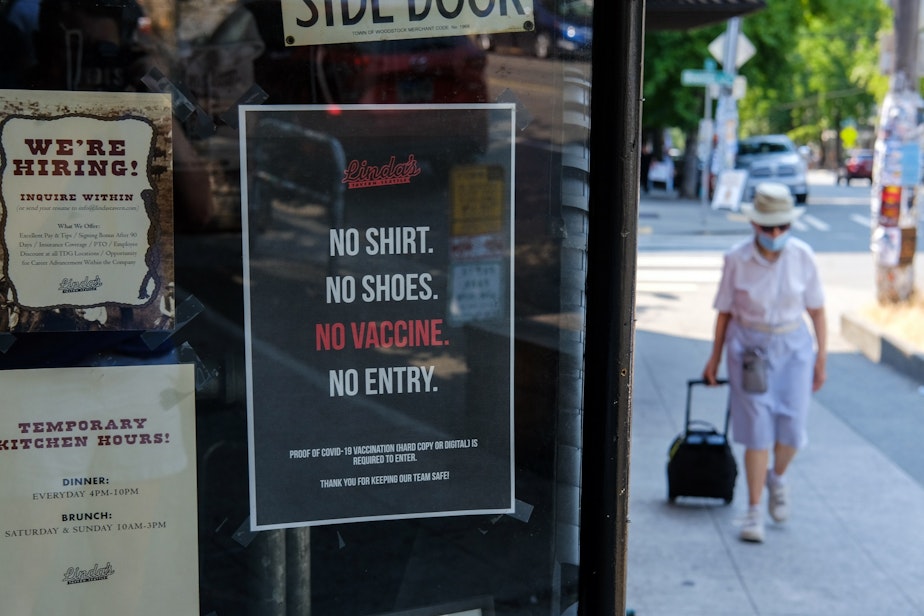King County's vaccine verification rule will end March 1

King County is set to enter a new phase of the pandemic as officials roll back the Covid vaccine requirements for many recreation venues put in place months ago.
Officials announced Wednesday that starting on March 1, proof of vaccination will no longer be required to enter bars, restaurants, gyms, and a host of other venues in King County.
While venues will no longer be required to check patrons’ vaccination status in March, officials say individual businesses can continue to set their own vaccination rules for guests.
"Our public health experts believe that now is the appropriate time to lift vaccine verification, based on high rates of vaccine coverage and the decrease in new cases and hospitalizations across the county," said King County Executive Dow Constantine in a statement. "We are moving in the right direction, and can continue taking additional steps toward recovery."
“This does not mean the pandemic is over," he said. "It means the current state of Covid-19 in the county indicates that this policy is no longer needed as one of the key strategies to protect the community.”
Vaccine verification requirements went into effect throughout King County in October 2021. The current rules require people 12 and older to show proof of full vaccination or a recent negative test in order to partake in a range of activities, such as: dining indoors at bars and restaurants; going to the movies, museum, theater, or seeing live music; and attending large outdoor events like football games.
Sponsored
“We announced the vaccination verification policy in anticipation of a fall and winter surge in cases. The intent was to reduce Covid-19 transmission in high-risk indoor settings and thereby reduce the burden on our hospitals, while providing time for more people to get fully vaccinated,” said Dr. Jeff Duchin, Health Officer, Public Health – Seattle & King County in a statement.
The rules were never intended to be permanent, Duchin said Wednesday. The initial order called for them to be re-evaluated in mid-March, they'll be lifted just shy of that mark.
Sponsored
As the omicron surge eases, Duchin said Covid-19 case and hospitalization trends are heading in the right direction — down.
King County has averaged 1,091 new daily cases over the past seven days, according to the county’s Covid-19 data dashboard. Case counts have fallen by 24% in the past week.
In addition, Duchin said Wednesday that since the vaccine verification requirement was put in place last year over one-quarter of a million King County residents have gotten their shots.
According to county data, roughly 87 percent of county residents 12 and older are now fully vaccinated, and more than 95 percent have at least one dose.
"All the key indicators are definitely headed in the right direction given where we were a month ago, which was much more dire it seemed," said Dr. Shireesha Dhanireddy, director of the infectious disease clinic at Harborview Medical Center.
Dhanireddy said case numbers and hospitalizations are still high but, like Duchin, it's the trends she's looking at, and those show rapid declines. She said where numbers will eventually plateau is unclear.
As local restrictions are rolled back, Dhanireddy said people will make decisions to mitigate risk depending on their personal situation.
Risk of severe illness for individuals and their loved ones is one thing to take into account based on things like vaccination status and underlying health conditions.
But potential disruptions to work, school, and source of income due to exposure or infection are also factors as people decide whether they feel comfortable in certain settings.
Reactions to the end of vaccine verification requirements will likely be mixed among businesses, according to Anthony Antone, president and CEO of the Washington Hospitality Association.
Antone said some businesses welcomed the rules when they were put in place in the fall, while others found them difficult. It depended on where businesses were located, who their patrons were, and whether their staff received pushback for enforcing the rules.
For some, he said: "This will be a big relief."
"For those who this has been a positive, hopefully they've built enough culture up that if they enjoy it they still have that option," he said referring to the fact that individual businesses may choose to continue checking vaccination status if they wish.
Overall, Antone said he sees the rollback as a hopeful sign.
"I'm glad that the need is waning, and I'm glad that these things are going away" he said.
Officials said Wednesday that this point in the pandemic must be viewed with nuance.
"Lifting the vaccine verification requirements signals pandemic progress, but not pandemic over," Duchin said.
Still, the city and county are taking steps towards this next phase.
Executive Constantine and Seattle Mayor Bruce Harrell also announced that county and city employees will be returning to in-person work in March. Employees have been working from home since 2020.
Sponsored
“This is cautious news, this is good news, but of course we are not out of the woods yet," Harrell said. "This steady decline in positive cases is much needed positive news, and by the spring we will hopefully know where this Covid crisis is going."
Harrell noted that about 65% of Seattle's employees (roughly 7,000 people) have been continuing to provide in-person services, such as park employees, fire fighters, and City Light staff. More than 5,000 city employees will return to the office in March.
"We have put into place alternative work arrangements that still will allow some remote and hybrid arrangement to ensure Seattle residents' needs are met ... but basically we think where the science is leading us, we can start coming back to work safely."
This story has been updated

